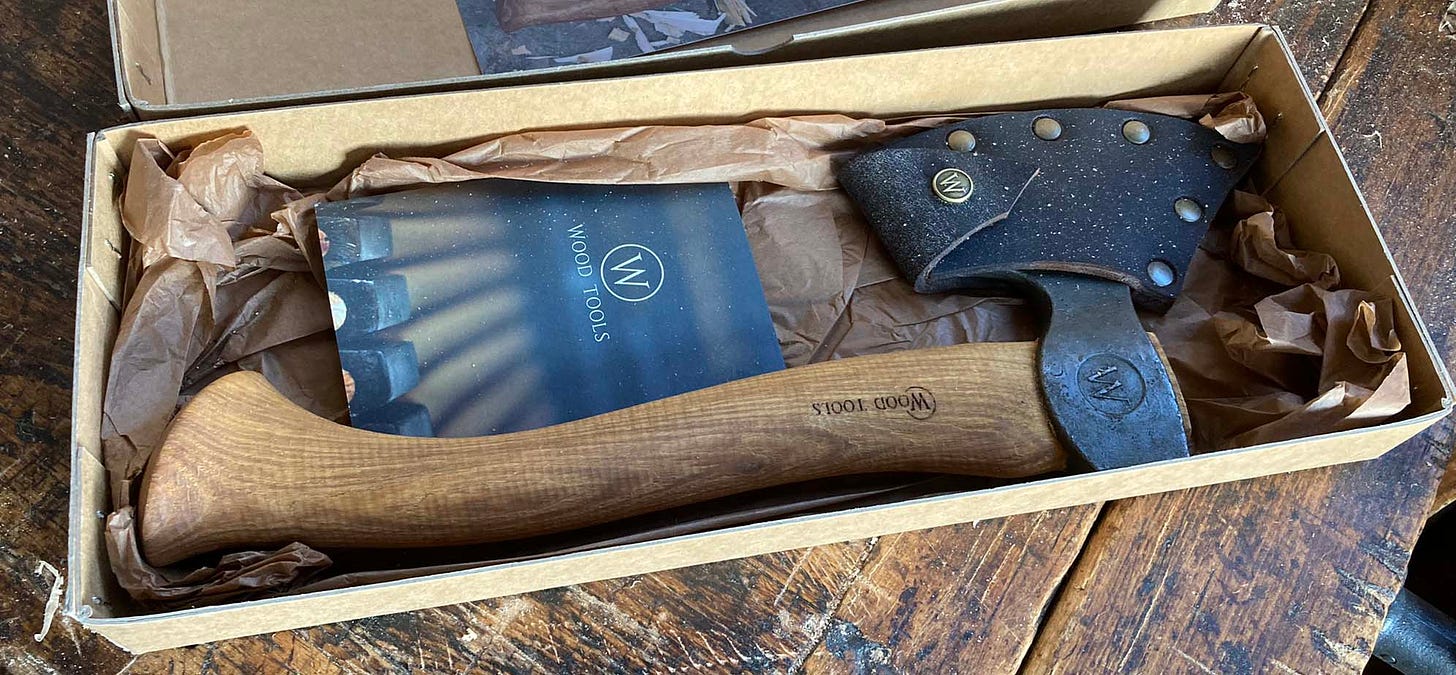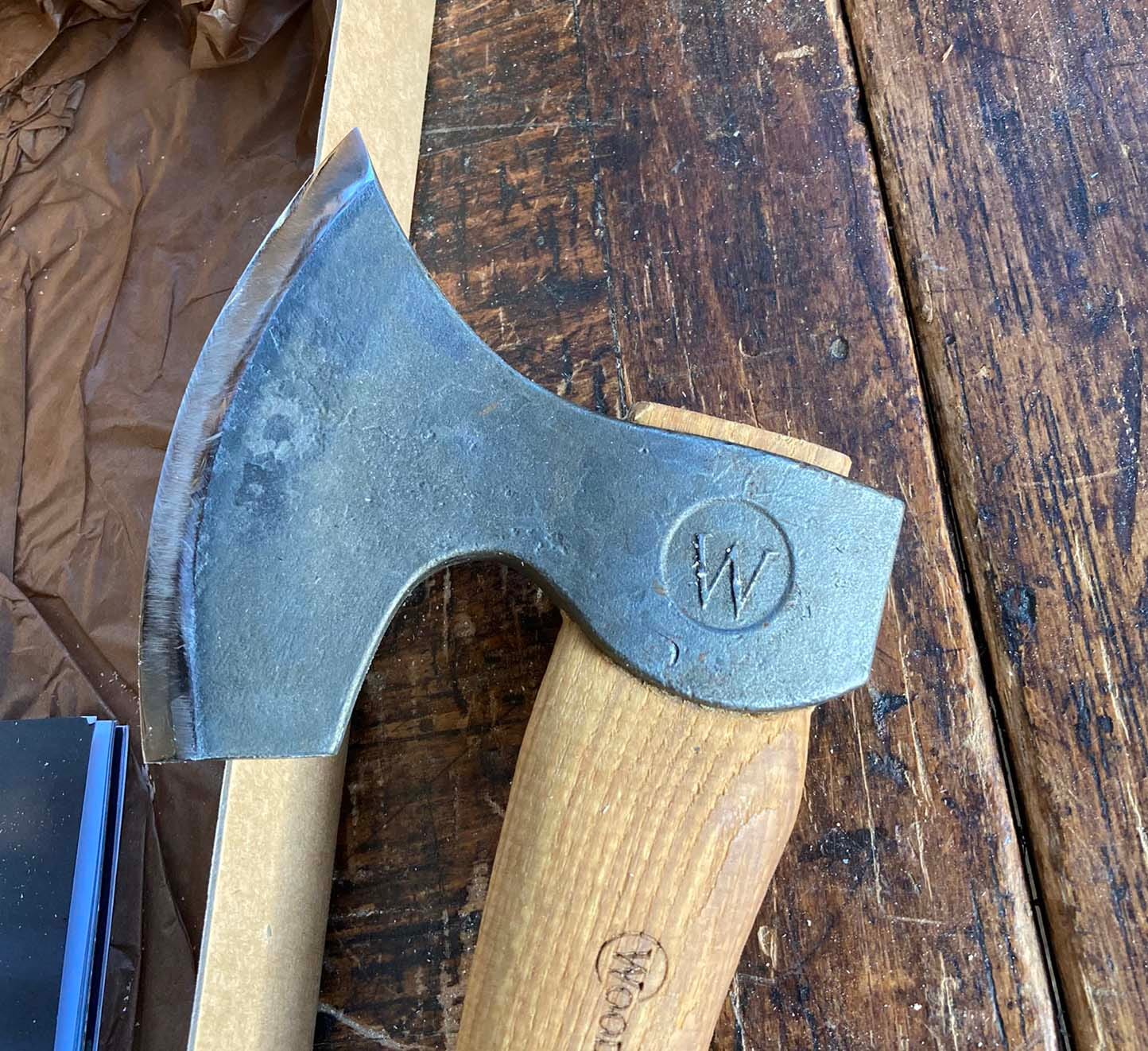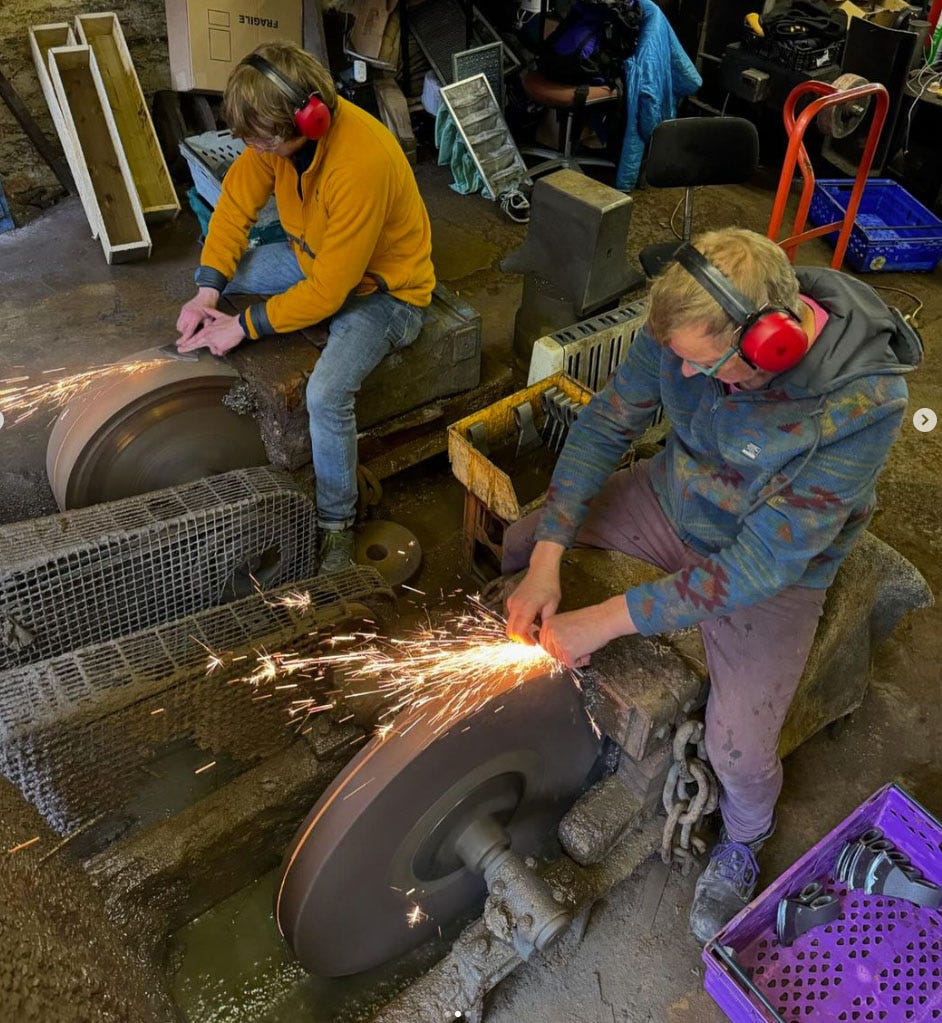In my work I do a fair bit of hewing with an axe/hatchet (I often use those terms interchangeably, I’ve seen a hatchet referred to as a “hand-axe”...presumably shortened from one-hand-axe). Working with riven stock I often come to a piece that’s split a bit too thick or wide but too close to its intended size to split further. So the axe. The green wood responds very nicely to hewing. I’ve always enjoyed the axe work, it’s fast, efficient and fun. Takes a bit of practice and 100% of your attention, but is a special process that many furniture makers never get to experience.
The incredible burst of attention to spoon carving in the past 15 years or so has given thousands of new woodworkers the thrill of working with these tools. One of the people I think was a driving catalyst for the spoon carving explosion is Robin Wood. He and I have known of each other for a long time, but first met just 10 years ago when I attended a bowl turning class he was teaching at North House Folk School. (that same week I first met Jarrod Dahl and Robin’s daughter JoJo Wood...)
A few weeks ago I got this box in the mail - containing a new “Sheffield Axe” by Wood Tools - the company that Robin, JoJo and Zack Wolstenholme run in Sheffield, England. I was an early customer of Robin’s when he was first making spoon carving hook tools, then added hatchets. I used to use his tools for students when I taught spoon carving classes. Here’s the link to this axe https://wood-tools.co.uk/tools/the-wood-tools-sheffield-axe/
The new hatchet shows how much they enjoy making great tools. It’s stunningly good. The shape reminds me of a tool that JoJo used - I think that was an old hatchet re-shaped by Robin to her specs. The head of this hatchet is 5 1/4” from the poll to the cutting edge and almost 5” along the edge. A cutout behind the edge (a “beard” shape to the head) gives you a place to choke up on the handle for finer cuts. A large swelling at the bottom of the handle gives you the opposite - a place from which you can really swing the axe for large, slicing cuts.
I measured the two bevels together and they came to 30°. They’re flat bevels, about 3/8” wide. Makes honing and stropping them easy, you’ll be able to feel bevels that size easily. But they come to you as sharp as can be - so with care you’ll not need to dress them for a while. A provided leather (or vegan- option made from recycled fire-hose) sheath will protect the edge.
Robin and Zack learned grinding on large stones from Brian Alcock, a Sheffield grinder who worked at that trade for over 50 years. When he recently passed away, they took over his grinding equipment, continuing a long tradition.
I’ve followed Robin’s work for a long time now and saw this tool as it was in development. It’s the first axe produced entirely in Sheffield for decades. Wood Tools has been working toward reviving Sheffield’s great reputation for edge-tool production for a long time and they’ve scored perfectly with this axe.
(to see what they’re up to on a regular basis follow their Instagram feed here https://www.instagram.com/woodtools/?hl=en )
Robin thought the axe might be useful for my furniture work in addition to smaller things like bowls and spoons. Generally I use a single-bevel axe for hewing furniture stock, but lacking one of those axes a double-bevel hatchet/axe can work quite well. This one did so easily. The main difference is the angle you hold the tool at in relation to the stock you’re hewing. And if you’ve never used a single-bevel hatchet then you won’t know any different, will you? I’ve often said if you can get the tool sharp, you can hew with it. But some tools will still be better than others. This one is better than many others.
I like the large bevels on this new axe, I can see and feel them better than thinner/shorter bevels. But that might just be what I’m used to.
An intangible but important aspect of this tool is that notion of a small, family-run company striving to make high-quality tools with no compromises. In Sheffield no less, a city whose history is synonymous with great edge tools, but that work had all but disappeared. Robin and crew have dedicated themselves to maintain a connection to, and continuation of, that history. They’re succeeding because enough of us acknowledge the importance of that sort of approach. We’re lucky to have toolmakers like that around. A quote from the inserted booklet from Wood Tools: “We are continually striving to make the best we can, so that our customers can make the best they can.” I highly recommend the axe. Price comes to about $240 - not sure about shipping. But it’s an axe for your lifetime and beyond…
[Robin sent me this axe, I didn’t pay for it, though I would have gladly done so if I didn’t already have more axes than I can use. I mostly stopped acquiring tools unless it’s one I don’t have. I told him I’d love to test out his axe, but that I probably would then give it away once I was done with it. In a few weeks, I’ll set up a random-drawing situation for paid subscribers to this blog. A way to get this tool out where it will get used and also to thank people for supporting my work.]








Andrew & Keith (& others) - it's a huge subject, but some pertinent points are these. The back of a single-bevel axe is slightly curved, very slight. And yes, that's the surface that is on the face of the board you're hewing. I find when hewing edges of boards either version of an axe works about the same. On the wider faces I much prefer a single-bevel hatchet. So for something like a panel in frame and panel work - can be as little as 6" wide, but up to 12" wide - easier to hew that face flat with a single bevel tool because of the way it hugs the board's face. You've got more of the axe's weight behind the cutting edge. With a single-bevel axe, the head is tilted out a bit to keep the bevel riding along that face. So, like so many things, it's all in the wrist. yea, right...
I purchased one from JoJo when taking one of her classes. It's a great axe and I use it when teaching or traveling. I prefer the single bevel axe I had forged from Slovenia by Don. Of the two I still prefer the Wood Tool handle. Great grip.